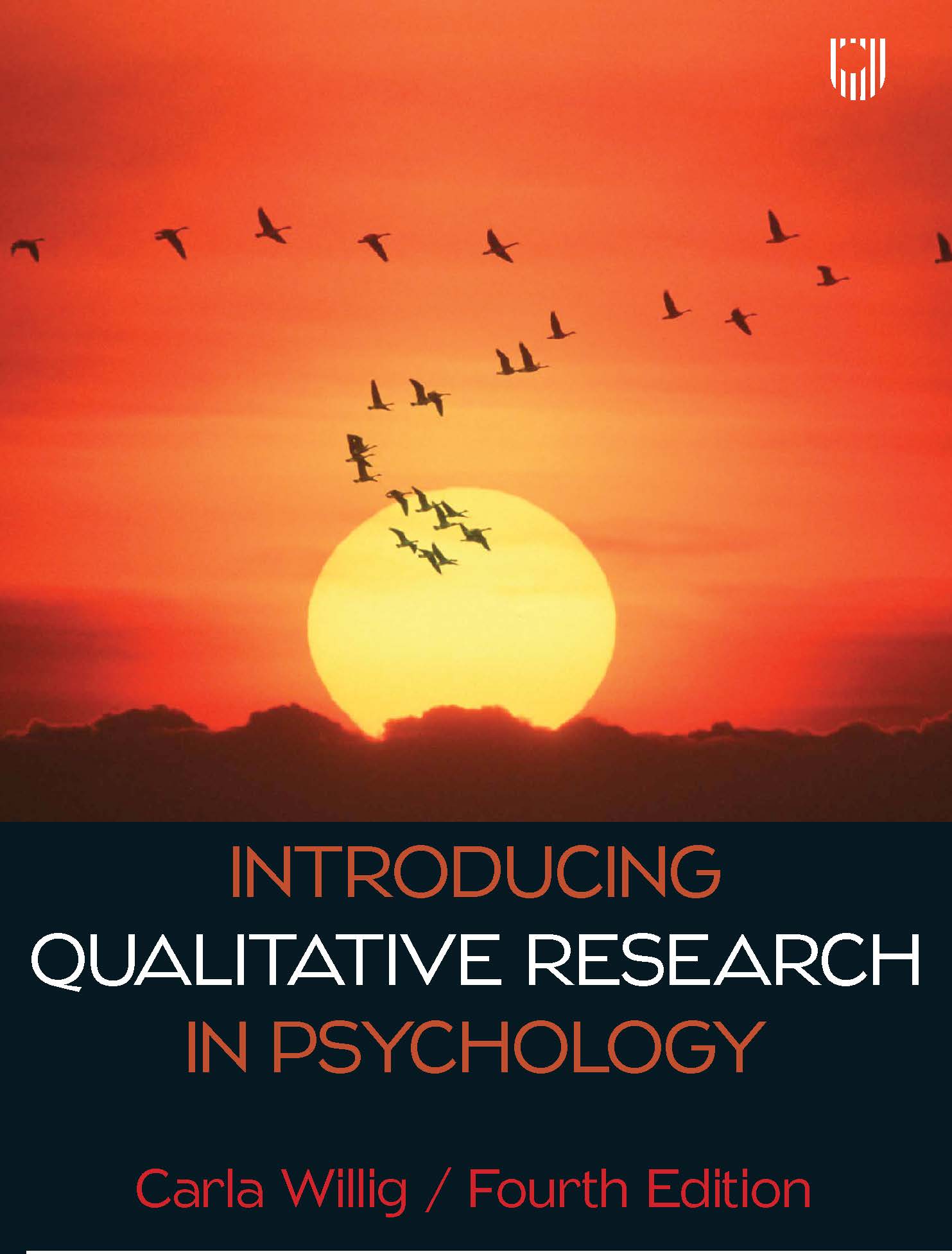Contents of this OLC
- Additional Resources for each chapter
- Worked example of thematic analysis
- Video reflection on conducting thematic analysis
- Multiple choice questions
- Essay quizzes
- Glossaries
Table of Contents for the Fourth Edition
Chapter 1 – From Recipes to Adventures
Chapter 2 – Epistemological Bases for Qualitative Research
Chapter 3 – Qualitative Research Design and Data Collection
Chapter 4 – The Role of Interpretation
Chapter 5 – Putting together a research proposal
Chapter 6 – Thematic Analysis
Chapter 7 – Grounded Theory
Chapter 8 – Phenomenological Methods
Chapter 9 – Discursive Psychology
Chapter 10 – Foucauldian discourse analysis
Chapter 11 – Narrative Psychology
Chapter 12 – Visual and other non-linguistic methods
Chapter 13 – Pluralistic Qualitative Research
Chapter 14 – Metasynthesis
Chapter 15 – Evaluating qualitative research
Chapter 16 - Conclusion
About this book
Introducing Qualitative Research in Psychology is a vital resource for students new to qualitative psychology. It explains when each qualitative research method should be used, the procedures and techniques involved, and any limitations associated with such research. Throughout the new edition, material has been re-organized and updated to reflect developments in the field, while Carla Willig's style of writing, popular with students and lecturers alike, remains unchanged.
Key features of the new edition include:
- Two new chapters, one on metasynthesis and one on pluralism in qualitative research
- A broadening the Visual Methodologies chapter to include other non-linguistic methods of data collection that engage with the physical environment, such as the walking interview and object elicitation
- Information and analysis on innovative dissemination methods such as performances and exhibitions
- Expanded coverage of the core question, “What makes qualitative research ‘research’?”, including clear explanations of the key tenets of the scientific method
- 'But it's not as simple as all that' boxes at the end of each chapter, where more complex issues, theoretical critiques and conceptual challenges are raised
Carla Willig is Professor of Psychology at City, University of London, UK. She is the author of numerous bestselling books for Psychology students and is widely admired for her friendly, practical approach to writing and to teaching.
Praise for the new edition:
"For many years I have recommended Willig’s Introducing Qualitative Research in Psychology to my students and this new and updated edition is no exception. I think that readers of this text will find it to be accessible, comprehensive and it will enable many people to become confident in conducting their own qualitative research.”
Alex Bridger, Senior Lecturer in Critical Social Psychology, University of Huddersfield, UK
“The clarity of Professor Willig’s writing and her knowledge of qualitative research means that it is always a pleasure to read her work. This 4th edition of her comprehensive and essential guide to conducting qualitative research in psychology is no exception. It reflects the emergence of new methods, approaches, and applications of qualitative research in psychology in fully updated and detailed chapters, including several on theoretical foundations, and research evaluation. New additional chapters on pluralistic qualitative research and metasynthesis are particularly useful. Altogether, this book is a vital resource and a valuable reference, both for those new to research and for those looking to further develop their skills and knowledge of qualitative research in psychology.”
Nollaig Frost, Adjunct Professor, School of Applied Psychology, University College Cork, Ireland
"Carla Willig’s book is the key authoritative introductory text which I use in my teaching and supervision. It addresses, in a clear and accessible manner, important aspects of qualitative research like epistemology and the role of interpretation, which are sometimes neglected in other texts. Each new edition helps keep readers in touch with the latest developments with pluralistic approaches and metasynthesis covered in this latest edition."
Professor David Harper, Programme Director (Academic) of the Professional Doctorate in Clinical Psychology at the University of East London, UK
“This exceptionally well-written text deserves a place in every psychology researcher’s toolkit, regardless of their career stage. Willig articulates key concepts, methods and terminology in a refreshingly accessible way for newcomers to qualitative research, while the ‘how-to’ guidance, real-world examples and critique of nine research approaches provides insightful practical assistance. Thoughtful critical reflection throughout ensures the text also makes a unique and valuable contribution to broader debates surrounding qualitative methodology and practice.”
Benjamin Gardner, Reader in Social Psychology, King’s College London, UK


Order your copy
If you are an instructor considering adopting this book for your course, you can order your inspection copy here; if you are a student, or indeed, anyone else interested in the book, you can buy a copy in print or eBook form here.



